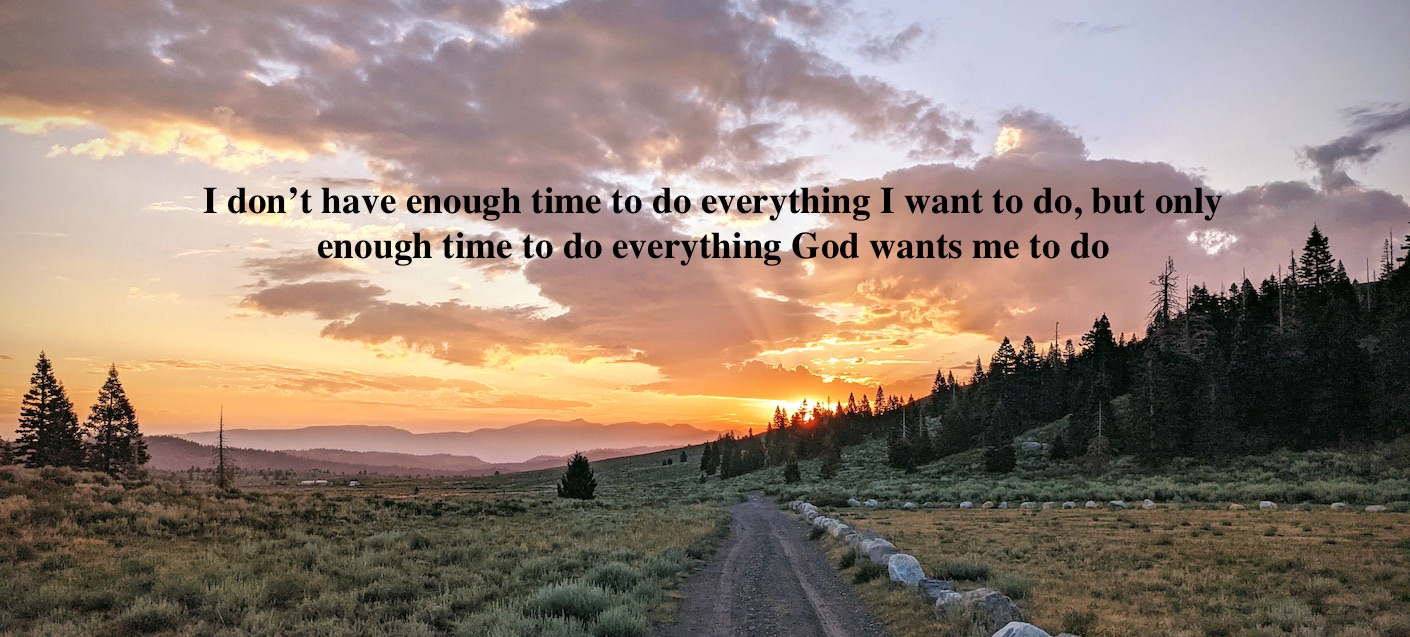We won't be able to do everything we want to do

Some time ago, I realized something important: I don’t have enough time to do everything I want to do, only enough time to do everything God wants me to do. I must frequently keep reminding myself of this.
Part of my struggle is that I’m a “check the boxes” type person, or Type A, some would say. I make lists of the things I plan to do, and try to check them off (see e.g. this prior post on task management). Sometimes, I get demoralized when I don’t accomplish everything I hoped to, or, even more, when the length of those lists just keeps growing. Part of me longs for that elusive day when, at the end of the day, I can take satisfaction in thinking, “Ah, today was great - I did everything I planned to do and more!” And when it doesn’t come, if I’m not careful, I feel dissatisfied, like I failed somehow.
That’s the context for my realization; if I’m looking for satisfaction in doing enough, I’m just never going to find it. There is always more to do. Partly, this is related to the consequences of the first sin in Genesis 3; God told Adam, “Cursed is the ground because of you; in toil you will eat of it all the days of your life…. by the sweat of your face you will eat bread till you return to the ground.” (Gen. 3:17-19) Partly, the idea here is that because of sin, we will have to work very hard until we die. In this life, we’ll never get to the place where we can say, “Now I’ve done everything and I can rest,” as I noted previously.
The Wall Street Journal highlights “the efficiency trap”
Relatedly, the Wall Street Journal ran an interesting article this week, “Escaping the Efficiency Trap – and Finding Some Peace of Mind. The basic point of the article is that, no matter where you are on the economic ladder or how productive you are, you feel overstretched and overcommitted. The article notes:
The problem with trying to make time for everything that feels important is that you definitely never will. The reason isn’t that you haven’t yet discovered the right time management tricks or applied sufficient effort, or that you need to start getting up earlier, or that you’re generally useless. It’s that the underlying assumption is unwarranted: There’s no reason to believe you’ll ever feel “on top of things,” or make time for everything that matters, simply by getting more done.
The article observes that we’ll never feel we’ve accomplished all we need, and notes that the more we do accomplish, the more demands will be placed on us. So it advocates, in a way, giving up on trying to find peace through accomplishing enough:
… once you stop investing in the idea that you might one day achieve peace of mind that way, it becomes easier to find peace of mind in the present, in the midst of overwhelming demands, because you’re no longer making your peace of mind dependent on dealing with all the demands. Once you stop believing that it might somehow be possible to avoid hard choices about time, it gets easier to make better ones.
Trying to deal with all these overwhelming demands, the article notes, can keep us from ever getting to those things which are truly the most important:
One can waste years this way, systematically postponing precisely the things one cares about the most. What’s needed instead in such situations, I gradually came to understand, is a kind of anti-skill: not the counterproductive strategy of trying to make yourself more efficient but rather a willingness to resist such urges—to learn to stay with the anxiety of feeling overwhelmed, of not being on top of everything, without automatically responding by trying to fit more in.
To approach your days in this fashion means, instead of clearing the decks, declining to clear the decks, focusing instead on what’s truly of greatest consequence while tolerating the discomfort of knowing that, as you do so, the decks will be filling up further, with emails and errands and other to-dos, many of which you may never get around to at all.
On the whole, I thought these were excellent points and ones I’m trying to remember and apply myself, rather than giving in to my tendency to turn everything into a list of tasks I simply must complete.
What this article is missing, though, is the perspective that real satisfaction can’t be found even in focusing on what’s most important to us. Instead, it’s to be found only in redemption through Jesus Christ and service to God – applying the attitude that we are here only to serve God, not to check enough off our agendas. We need the attitude of Paul in Phil. 1:21-23, who said, “For to me, to live is Christ and to die is gain. But if I am to live on in the flesh, this will mean fruitful labor for me; and I do not know which to choose… having the desire to depart and be with Christ… yet to remain on in the flesh is more necessary for your sake.” Real peace and rest will come not in this life, but only when we depart for the next life which will no longer be stained by sin. Or, as Jesus told the Samaritan woman in John 4, “Everyone who drinks of this water will thirst again, but whoever drinks of the water that I will give him shall never thirst…” (John 4:13f).